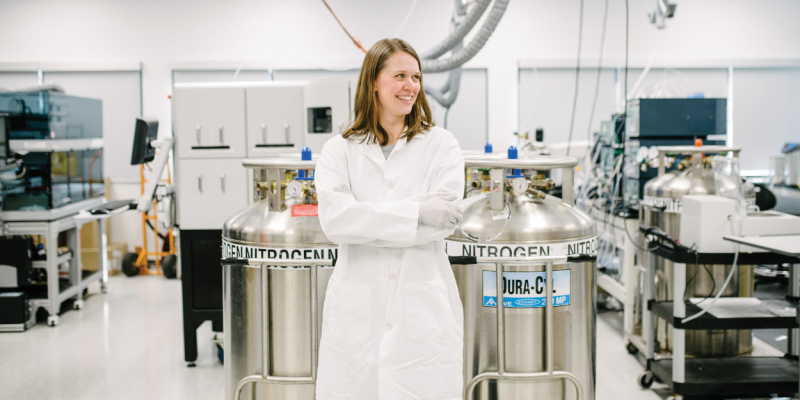By Emily McCluhan | Photography by Hillary Schave
Researching a cure for Type 1 diabetes. Creating tissues to test chemicals on instead of using humans and animals. Developing “smart” pesticides for disease management and crop improvement. These are just a few of the innovative projects happening at biotech companies in Madison. And while the majority of biotech companies call California and Boston home, an increasing number are finding Madison a nurturing community to grow their ideas (and, there’s a 30% lower cost of living here than on the coasts).
Jessica Martin Eckerly, co-founder and CEO at Forward BIOLABS in Madison, gets to see and lead this innovation firsthand. Forward BIOLABS is a fully-equipped, co-working lab and office space for biotech start-ups. Often the cost to purchase or lease equipment can range into the hundreds of thousands of dollars for these companies. Forward removes that barrier and accelerates development by allowing teams to start their work in the lab as soon as they have funding.
Martin Eckerly notes that 18 companies are using the space currently and founders are from diverse ethnicities and four continents. There are a number of women startup founders working at Forward, but Martin Eckerly would like to see more.
“In general in biotech, the funding for female founders could be improved. The first step in remedying that is awareness,” says Martin Eckerly. “And the next step is creating programs or funds that specifically focus on opportunities for women.”
According to Doyenne Group, a Madison-based organization that serves early-stage, women-led ventures, women received just 2.3% of venture capital funding across the U.S. in 2020. Doyenne’s Investor Accelerator program aims to educate women on smart investing because “women are more likely to invest in women-led companies than men,” according to their website.
While funding is lagging for women-led startups, anecdotally, Martin Eckerly is seeing a shift in more women being hired into executive roles at biotech companies, and more companies are putting a focus on creating boards of directors with at least 50% women. And although Forward isn’t involved in funding startups, Martin Eckerly says their structure helps reduce barriers for women founders when they do receive funding.
“The startup costs are already high in biotech because we’re not just coding an app for phones. There’s advanced diagnostic equipment, safety protocols, refrigeration and redundancy measures in case systems go down,” says Martin Eckerly. “By providing all of that for our companies, they may only have to raise $1 million instead of $1.5 million. That’s a big deal, especially for women that struggle to get funding to start with.”
At Nimble Therapeutics, a Madison-based company that develops molecules for pharmaceutical companies to use in drug development, Lauren Goodrich-Berto (pictured above) understands the complexity and cost of starting up a biotech lab. She planned and implemented the lab space and built out Nimble’s research team when the company started in 2019. Now she leads their research and operations division. As one of five women in a company of 24, she finds herself focusing on how to level the playing field for women every day.
“As a female leader, I have to fight for equal pay for the females on my team and create opportunities for other women,” she says.
She implements practices such as making sure she has a female coworker on interview panels or includes resumes from female candidates — even though the vast majority are from males. She admits it was jarring to go from the university setting where there is a strong push for equality in labs and research faculty, to the corporate world where she’s often the only female in the room.
“We have to bring each other up and support one another as we move from grad school to the meeting rooms and boardrooms of the biotech industry,” she says.
Martin Eckerly also wants to do more at Forward to not only get more women in the lab, but keep them there. Right now, she says her team of two focuses on managing onboarding and day-to-day support for 17 startups during a pandemic and all of the supply chain challenges that come with that. But as her team expands and in-person programming becomes an option, she wants to explore education programs and networking opportunities focused on women.
“Having perspectives from different backgrounds in this industry is critical,” she says, and adds that watching science transition from the university setting out into the world where it can impact lives is inspiring and infinitely rewarding.
BY THE NUMBERS
The biotech industry is broad and includes companies that focus on pharmaceuticals, therapeutics, medical devices, stem cell research, food science, agricultural research and more. Here’s what the landscape looks like in Madison and across the nation.
- 8% Women representation at the CEO level of biotech companies across the nation
- 47% Women representation at all levels of biotech companies across the nation
- 1,709 Number of biohealth companies in Wisconsin
- 46,160 Biohealth industry employment




